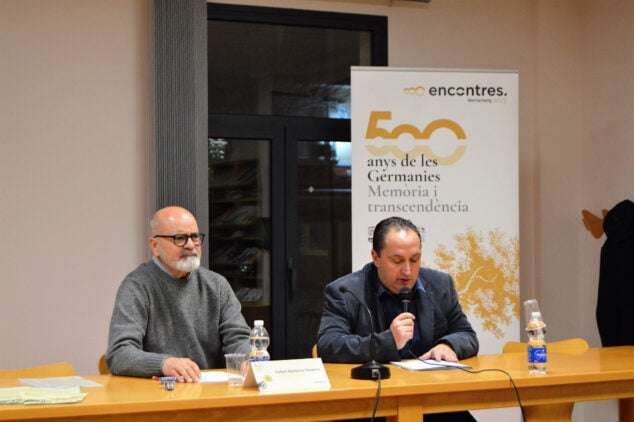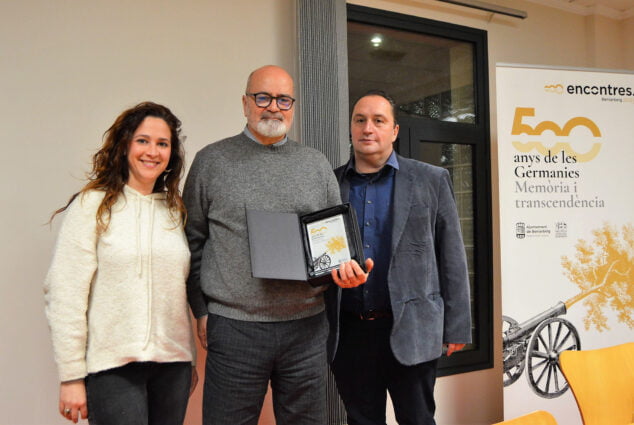Professor Rafael Narbona, from the Universitat de València, gave the second conference of Encontres Beniarbeig, held last Thursday, February 2. Earlier, Toni González Picornell, member of the organizing committee and presenter of the event, addressed the large audience and thanked them for the fidelity shown throughout the ten years of the Encounters, nine if one discounts the one that was not held due to the pandemic.
The conference on the Germanía in the city of Valencia was highly anticipated within the cycle, above all, because, as Narbona said, this movement was born in this city and later spread to towns and cities in the country, both royal and noble. . In this sense, the professor claimed the name "Germanía" in the singular, which designates a single movement despite the diversity and gradualness of its manifestations.
Basically, the claims of the agermanats can be summarized in the purposes of obtaining equal justice for all: participation of the people in the city government, eradication of abuses and protectionism of the unions against the liberalism of the merchants who promoted a production, especially textiles, outside the unions and caused a drop in prices but also a much lower quality of the products.
In a first stage, according to Narbona's exposition, the movement had a legalistic character and had the approval of the new monarch Carlos I. It must be taken into account that in 1482 the Fueros were printed and in 1515 the Book of Privileges of the City and Regne of Valencia.
Both prints, made in the city so close to the start of the agermanat movement in 1519, implied a deep political culture of the people and gave legal basis to their claims against seigneurial abuses that precisely ignored provisions contained in the Llibre de Privilegis. For example, the right of the guilds to have representation in the juries of the city, a right granted by King Peter the Great in the XNUMXth century and not applied later.
The Germanía can be understood as a popular movement in defense of the laws of the kingdom and the identity of Valencia in the context of the growing centralized monarchies and opposed to foralism. Paradoxically, "what was revolutionary at that time was a look at the past and the recovery of laws promulgated centuries ago, which had ceased to be applied," Narbona highlighted.
The speaker went on to review some of the causes that contributed to the revolt, such as fear of an attack by pirates, as had happened a few years before in Cullera and other places, which led to an order to arm the guilds promulgated by Fernando el Católico that It had not yet been fulfilled and that the Germanía finally, with the consent of King Carlos, made effective.
A second cause was the deep religious feeling inspired by the readings of authors such as Rocatallada, Llull or Eiximenis, in addition to Joan Alamany's book on the coming of the Antichrist printed in 1520. A third cause indicated by the speaker was fear, which he described as xenophobic, an uprising of the Mudejars. It is worth adding the importance of the millennial movement embodied in the figure of the encobert, or of the successive encoberts, who were understood as an opposition to the dynastic rights of Carlos I and the proclamation of a king of the Crown of Aragon in a son of the infante Juan de Aragón and Margarida de Austria, kidnapped under strange circumstances.
Professor Narbona's presentation then highlighted the change in the monarch's policy due to the appointment of the viceroy, the count of Mèlito, a military man who opposed the political organization and administrative reforms of Germanía by force of the militia, and also to the formation of the agermanat army, which caused the radicalization of the conflict and the military campaigns
He made special reference to that of Esteve Urgellés, in the north of the Valencian Country, defeated by the mascarat army at Almenara. Finally, Narbona made reference to the arrival of Germana de Foix and the cruel repression that she practiced along with her husband, the Duke of Calabria.
The next session of Encontros a Beniarbeig will take place on February 16 by Vicent Terol, archivist of Ontinyent and Albaida, who will talk about The Germanía to the Valencian Country ia les Marines.








